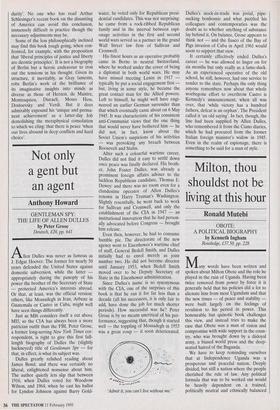Not only a gent but an agent
Anthony Howard
GENTLEMAN SPY: THE LIFE OF ALLEN DULLES by Peter Grose Deutsch, f20, pp. 641 Allen Dulles was never as famous as J. Edgar Hoover. The former for nearly 50 years defended the United States against domestic subversion, while the latter appropriately during the panoply of his power the brother of the Secretary of State — protected America's interests abroad. Or that, at least, was the official version: others, like Mossadegh in Iran, Arbenz in Guatemala or Castro in Cuba, might well have seen things differently.
Just as MI6 considers itself a cut above MI5, so the CIA has always been a more patrician outfit than the FBI. Peter Grose, a former long-serving New York Times cor- respondent, is right to give this first full- length biography of Dulles the (slightly hackneyed) title of Gentleman Spy — for that, in effect, is what its subject was.
Dulles greatly relished reading about James Bond, and there was certainly no liberal, enlightened nonsense about him. The author quietly lets slip that between 1916, when Dulles voted for Woodrow Wilson, and 1964, when he cast his ballot for Lyndon Johnson against Barry Gold- water, he voted only for Republican presi- dential candidates. This was not surprising: he came from a rock-ribbed Republican family and in the interval between espi- onage activities in the first and second world wars served as a partner in the grand Wall Street law firm of Sullivan and Cromwell.
His finest hours as an operative probably came in Berne in neutral Switzerland, where he worked under the cover of being a diplomat in both world wars. He may have missed meeting Lenin in 1917 typically he put a social engagement first but, living in some style, he became the great contact man for the Allied powers. Left to himself, he might well have engi- neered an earlier German surrender than that which eventually came about on 6 May 1945. It was characteristic of his consistent anti-Communist views that the one thing that would never have bothered him — he did not, in fact, know about the Soviet Union's suspicions of his activities — was provoking any breach between Roosevelt and Stalin.
After such a colourful wartime career, Dulles did not find it easy to settld down once peace was finally declared. His broth- er, John Foster Dulles, was already a prominent foreign affairs adviser to the luckless Republican candidate, Thomas E. Dewey: and there was no room even for a clandestine operator of Allen Dulles's renown in Harry Truman's Washington. Slightly resentfully, he went back to work for Sullivan and Cromwell, and only the establishment of the CIA in 1947 — an institutional innovation that he had person- ally advocated before Congress — brought him release.
Even then, however, he had to consume humble pie. The directorate of the new agency went to Eisenhower's wartime chief of staff, General Bedell Smith, and Dulles initially had to enrol merely as joint number two. He did not become director until January 1953, when Bedell Smith moved over to be Deputy Secretary of State in the Eisenhower administration.
Since Dulles's name is so synonymous with the CIA, one of the surprises of this book is that he ran it for far less than a decade (all his successors, it is only fair to add, have done the job for much shorter periods). How successful was he? Peter Grose is by no means uncritical of his per- formance, suggesting that, though it started well — the toppling of Mossadegh in 1953 was a great coup — it soon deteriorated.
Admit it, you can't live without me.' Dulles's stock-in-trade was jovial, pipe- sucking bonhomie and what puzzled his colleagues and contemporaries was the doubt as to whether anything of substance lay behind it. On balance, Grose appears to think not — and the fiasco of the Bay of Pigs invasion of Cuba in April 1961 would seem to support that view.
It certainly effectively ended Dulles's career — he was allowed to linger on for six months but only really as a lame-duck. As an experienced operative of the old school, he still, however, had one service to render to the state. Perhaps the only thing anyone remembers now about that whole woebegone effort to overthrow Castro is Kennedy's announcement, when all was over, that 'while victory has a hundred fathers, defeat is an orphan'. The President called it 'an old saying'. In fact, though, the line had been supplied by Allen Dulles, who remembered it from the Ciano diaries, which he had procured from the former Italian foreign minister's widow in 1945. Even in the realm of espionage, there is something to be said for a man of style.


























































 Previous page
Previous page